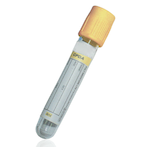Amylase (serum)
Specimen Volume
1mL blood (~250uL sample)Turnaround Time
24 hoursSample Processing In Laboratory
No special requirementsSample Stability
1 month at 2-8°CGeneral Information
Amylase is important for diagnosis and monitoring of acute or chronic pancreatitis because of the lack of specific clinical symptoms. Acute pancreatitis occurs most commonly because of obstruction of the pancreatic duct or abdominal trauma causing physical damage to the pancreas. Amylase may be 5 to 20 times higher than normal in acute pancreatitis but as grossly elevated levels may be evident for only a short time, a slightly increased level does not necessarily exclude pancreatitis. Elevated serum pancreatic amylase is not diagnostic of pancreatitis but its elevation in urine is confirmatory of pancreatitis, pancreatic trauma or carcinoma as the amylase released is not completely bound by the immune complex and therefore subject to glomerular filtration.
Amylase can also be raised in other conditions such as severe uraemia, severe diabetic ketoacidosis, other acute abdominal disorders, salivary gland disorders or macroamylasaemia.
Patient Preparation
Saliva and sweat contain amylase and care should be taken to avoid contamination.
Reference Range
25 - 125 IU/L
Source of Reference Range
Abbott DiagnosticsSpecifications
-
EQA Status:
UK NEQAS for Clinical Chemistry Scheme
- EQAS Scheme: Yes








